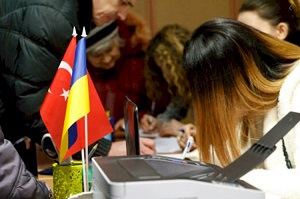The Crisis of Political Ethics and MP Transfers: A Reflection on Turkish Politics
Image Over Substance: The Politics of Deception

The Crisis of Political Ethics and MP Transfers: A Reflection on Turkish Politics
LOCAL AGENDA / TÜRKİYE
In his recent article, En Politik columnist İrfan Sönmez delves into a troubling aspect of contemporary Turkish politics: the erosion of political ethics, highlighted by the practice of transferring Members of Parliament (MPs) from one party to another. Sönmez's critique is a broader reflection on the promises made by political parties during their founding stages, the eventual divergence from these promises, and the consequences for the political landscape and public trust.
Grand Promises, Hollow Outcomes
Political parties often emerge with lofty ideals, promising justice, fairness, and a commitment to the people. In their early days, these parties position themselves as defenders of the downtrodden, standing against corruption and vowing to uphold ethical standards. Sönmez notes that these promises—whether about protecting the rights of the poor or ensuring that justice prevails—are frequently used to attract support from a population grappling with economic difficulties and disillusionment.
However, as soon as these parties come into power, a shift occurs. The promises made during the campaign trail fade away as political leaders focus on maintaining their image. Sönmez argues that once a party establishes a certain image—be it centered on Islamism, nationalism, or socialism—it becomes easier to justify any action, no matter how unethical, under the banner of protecting that image. This manipulation of ideology creates a loyal base of supporters who defend the party or leader regardless of their actions, convinced that they are protecting a higher cause.
Image Over Substance: The Politics of Deception
Sönmez’s analysis goes further, illustrating how political figures use their established image to shield themselves from criticism. For instance, instead of directly defending their personal actions, politicians often claim that attacks are being made against the ideological framework they represent. This tactic deflects attention away from their own wrongdoing and mobilizes their base to defend a broader cause—whether it be religion, nationalism, or another ideology.
This approach allows political leaders to remain unscathed by controversies, as their followers view criticism as an attack on their shared values. The end result is a political climate where accountability is diminished, and the line between ethical and unethical behavior becomes increasingly blurred.
The AKP's Shift: From Principles to Pragmatism
Sönmez uses the AKP (Justice and Development Party) as a case study to illustrate how this dynamic plays out in practice. When the AKP was founded, it promised to protect the rights of the marginalized and to bring ethics into politics. One of its key principles was to avoid behind-the-scenes deals, particularly concerning the transfer of MPs from other parties. However, two decades into power, the AKP has abandoned many of these ideals.
Recently, the AKP welcomed two MPs and 13 mayors who switched allegiances. These MPs were originally elected under the İYİ Party banner, representing voters who opposed the AKP. By transferring to the AKP, these MPs effectively redirected opposition votes into the ruling party's favor—a practice Sönmez describes as "vote fraud." This, he argues, renders the act of voting meaningless, as the will of the voters is subverted by backdoor deals.
The Erosion of Political and Moral Integrity
Sönmez’s broader argument is that Turkey has suffered not only economically under the AKP’s rule but also morally. Political ethics have reached an all-time low, and holding power has become synonymous with distributing benefits to loyal supporters. Religion, once a deeply respected institution, has been commercialized and exploited for political gain. This degradation of values has led to widespread distrust in politicians who speak of faith and ethics.
The most troubling outcome, according to Sönmez, is that almost anything now appears normal. Ethical standards have collapsed, and the boundaries between right and wrong have become blurred. The transfer of MPs is just one symptom of a larger crisis where integrity has been sacrificed in the pursuit of power.
Conclusion: A Call for Ethical Revival in Politics
Irfan Sönmez’s article serves as a stark reminder of the need for a revival of political ethics in Turkey. The practice of MP transfers, the manipulation of ideological loyalty, and the erosion of trust in political promises are all symptoms of a deeper moral crisis.
For Turkish democracy to thrive, there must be a return to the principles that political parties often claim to champion—justice, fairness, and integrity. The future of the country depends not on the transfer of MPs or short-term political gains but on restoring trust in the democratic process and ensuring that the will of the people is respected.
Without a renewed commitment to ethical governance, Sönmez warns, the cycle of deception and disillusionment will continue, further damaging the social fabric and eroding the very foundations of democracy in Turkey.






































